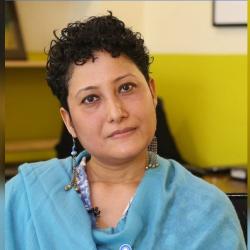In Assam, it was so arranged that India's national flag, which replaced the flag of the revolution, would be hoisted on behalf of the organ of revolution, the Indian National Congress and not the Government. So it came to pass that Maulana M. Tayyebulla, as the President of Assam Congress, ceremonially unfurled the national flag at Guwahati (then Gauhati), the headquarters of Congress in Assam, heralding the advent of freedom.
The Day of Glory for India, will remain the proudest day of my life because I can say that it was Maulana Tayyebulla, my father who hoisted the Indian national flag on the first indepedence day. How I wish every son or daughter could say that about his or her father!
On this great and auspicious occasion, while unfurling the flag, my father paid the nation's homage to the brave Kanaklatas of the country who by their blood streaking from the bullet-holes in their breasts gave to the nation this great ensign of freedom, and hundreds of Kushal Kunwars who gave their lives on the gallows and faced the bullet, and thousands who made immense sacrifices and suffered for the liberation of our Motherland – these martyrs and heroes of the land.
Compared to the glorious deeds of the martyrs and heroes, my father's jail-going (he suffered imprisonment first in 1921 then in 1931 and 1939 and finally in 1942) was like pale moon-shine before the blaze of the shiny orb. In the words of the Poet-Laureate Tagore: ' Amar matha nato kore dao he Prabhu' (O Lord, make my head bow low.)
One event of interest: Before the 'appointed day' of the Independence of India Act, 1947, the Governor of Assam, the late Sir Akbar Saleh Hydari 'before the appointed day' promulgated a Notification under the Act on August 14, 1947, inaugurating Joint Electorate as the system of voting – the first in India, pre-Constitution.
Tayyebulla was thus the first man in India to be elected in November 1947, by Joint-Electorate suffrage to the Legislature, to the Assam Legislative Assembly. The ancien regime 'devil' of separate electorate was at last cast away.
By non-violence, Mahatma Gandhi emancipated India in bondage to freedom. The British Viceroy, Lord Louis Mountbatten, coming soon after the Chruchillian Viceroy the Lord Linlithgow, became free India's own Quit-India Governor-General. Did not Loius quit the shore of India as India's best friend in the United Kingdom? What a miracle: Non-violent means had non-violent end! In Gandhian philosophy of non-violence, means and end are one and the same concept. As night follows the day, non-violent revolution, the means, led to the non-violent Quit India, the end. This is Gandhian doctrine having roots in the Law of Karma of Hindu-cum-Buddhist scriptures and in the biblical Law of Love, as was preached and practised by Jesus.
Non-violence of Gandhi bridged the wide gulf between India and Britain, and brought the two great countries closer together as never before. This is the legacy of Gandhi – the triumph of non-violence. Britain quit India and free India was born.
May the Republic of India - the 'Bharat Mata' of the Hindus, the 'Hindustan' of the Muslims and the 'India' of the Christians – established on the basis of Gandhian polity of non-violent socialism (call it 'Sarvodaya') and secularism grow from strength to strength year by year in every way. Jai Hind.
by Omar Luther King The writer of this article Omar Luther King was born in Nowgong, Assam to a Muslim family of Indian national freedom fighters, Omar is now residing in Delhi with his wife Roma, and their sons Amit (25) and Aman (21). He is the son of Maulana M. Tayyebulla, the President of Assam Congress at the time of independence, the person who ceremonially unfurled the national flag at Guwahati (then Gauhati), the headquarters of Congress in Assam, heralding the advent of freedom.
The writer of this article Omar Luther King was born in Nowgong, Assam to a Muslim family of Indian national freedom fighters, Omar is now residing in Delhi with his wife Roma, and their sons Amit (25) and Aman (21). He is the son of Maulana M. Tayyebulla, the President of Assam Congress at the time of independence, the person who ceremonially unfurled the national flag at Guwahati (then Gauhati), the headquarters of Congress in Assam, heralding the advent of freedom.
After studying in Cotton College, Guwahati and passing out from Guwahati University, he worked in Gandhi Peace Foundation, New Delhi as Research Assistant, in YMCA, Guwahati as the Secretary, in the Lok Sabha Secretariat as Research Assistant and in the Rajya Sabha Secretariat as Assistant Director. He is now serving the Lord fulltime as a missionary amongst the Muslims of Northeast India, Bangladesh and other Islamic countries. He has travelled widely in India as a government servant and outside India as a missionary.
His writings have appeared in several national dailies and periodicals, not to speak of Christian magazines. Author of “Indian Boy in Love – Essence of Religion” (1966), he has also written his autobiography, “My God, My India, My Family and Me”.
- Add new comment
- 68766 reads








Comments
Pages
Add new comment